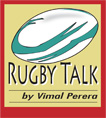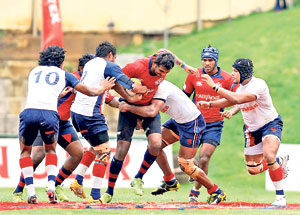 The expectation from rugby will rekindle as Sri Lanka host a Junior Sevens tournament which is an IRB sanctioned event. This will be along with the “Carlton Sevens” expected to be held in November 2010. According to Lasitha Gunaratne the Vice President of the SLRFU it is a test event limited to teams in Asia. The expectation from rugby will rekindle as Sri Lanka host a Junior Sevens tournament which is an IRB sanctioned event. This will be along with the “Carlton Sevens” expected to be held in November 2010. According to Lasitha Gunaratne the Vice President of the SLRFU it is a test event limited to teams in Asia.
The expectation and proposal to the IRB is for this to be an international event according to Gunaratne. Indirectly this gives hope that the Governing Body will recognize and continue to recognize Sri Lanka. What is now necessary is to polish the scrapes and make the boot look smarter in the year ahead once the preliminary obstacles are out of the way.

Kandy has been the side to beat during the past decade. |
The attendance at the Clifford cup rugby knock final played at Bogambara shows that the game is still alive. It was a good game of rugby “one of the better ones that has been seen at club level this season”. It was welcome change to the unsavory news that has been dished out during the recent past. One thing that needs to be remembered is what the spectator wants. He or she is not interested in the politics and or the nuisance of those who do not want to enjoy a sport. It was laughable as some ask and wear the cap that suits them most while trying to justify unacceptable behavior in whatever form it comes. It could be hooliganism which is the bread and butter of some, filthy language that need not be used in public or the poaching of players. As I have said before it is important that the there is a need for a balance of player distribution if one needs a healthy competition.
The advent of Navy and Air Force has given players another two opportunities to consider when they want to continue the game. Player attraction, which we like to call poaching, was the strongest point of Kandy Sports Club over the years. Today there are two more key players involved. It so however necessary that those who have to bear the brunt of movement away are looked after by the controlling body. Else these clubs will fall off and the competition will be among few and will not attract attention. What needs also to be discouraged is mid season movement. This disrupts a club and the competition and brings down the competitive rugby the public wants to see.
The spectator wants to see good rugby and needs to be assured that the ground and the surrounding areas are safe. He or she should know that they will not be caught in the cross fire as happened in the semi-final played between Air Force and Kandy Sport Club and three school matches during the season. What is important is to find out why it happened and take action to prevent same.
It was no doubt a memorable moment for Kandy who won the Knock out for the 16th time in 17 years. As one rugby figure commented it was good for the game that Navy and Air Force came into the final stages and played against Kandy in Kandy. This brought in more supporters from the non Kandy team than would have been if a Colombo Club played in Kandy. It was around 2000 spectators that traveled to Kandy as against what would have been 200. This also has brought in more revenue to the Union through ticket sales.
As we talk of the game and its future the recent events lay strong emphasis on a charter being prepared for acceptable team behavior. This is for all who get involved at clubs and schools’. It should be understood that effective team policies we can set the expectation of behavior of all concerned, Players, Coaches, administrators, supporters etc. Reading excerpts of a book “Coaches Guide to Team Policy I came across the following which I thought was worth sharing.
Setting of policies one should look at the importance of each in relation to the situation. It will be different at the National, Club, School; will be different at the under 20 under 16 under 12 etc. Regardless of what you cover the important thing is that it spells out what your expectations are. These guidelines should cover the expectation and outcomes expected form team members, coaches, parents, club members, advisory committee member’s supporters etc. They should include; Respectfulness: Treating others as you wish to be treated by them. Respectful athletes and coaches accept decisions by officials or superiors without arguing, and avoid violence.
This includes using good language and non use of undesirable body language even when you are angry or disappointed, accepting victory and defeat .Responsibility: involves doing the right thing. This includes trying hard, showing up regularly for practice, and accepting responsibility for actions that lead to unexpected consequences. Caring: Being caring involves compassion, gratitude, and empathy. Athletes and coaches who are caring are gracious in both victory and defeat.
Honesty: involves being truthful and forthright and acting with integrity and loyalty. Fairness: Fairness-playing by the rules and the spirit of the game whether you are winning or losing-is one of the key elements of sportsmanship. Good Citizenship: Perhaps the hardest to define because it encompasses attitudes and behavior outside of sport, good citizenship involves contributing positively to your community. Conflict Resolution: Conflict is part of the complexity of human behavior and cannot be completely avoided. However, having within your policies a means to address conflicts will make it easier to solve them and to minimize distractions when conflicts arise.
A code of conduct, sometimes called a code of ethics or code of behavior, is a document that clarifies how people associated with your team are expected to behave and their duties and responsibilities and should be an integral part of your team policies. A code of conduct can be viewed as a contract or agreement between the team and the person whom it applies to. Many teams now require their athletes, staff, parents, and others involved to sign a statement indicating that they have read and understood the relevant code of behavior or conduct. A signed statement serves as a record that the policy was explained, that they understand the code of conduct, and that they agree to act as required.
*Vimal Perera is a former Rugby Referee, coach and Accredited Referees Evaluator IRB |

 The expectation from rugby will rekindle as Sri Lanka host a Junior Sevens tournament which is an IRB sanctioned event. This will be along with the “Carlton Sevens” expected to be held in November 2010. According to Lasitha Gunaratne the Vice President of the SLRFU it is a test event limited to teams in Asia.
The expectation from rugby will rekindle as Sri Lanka host a Junior Sevens tournament which is an IRB sanctioned event. This will be along with the “Carlton Sevens” expected to be held in November 2010. According to Lasitha Gunaratne the Vice President of the SLRFU it is a test event limited to teams in Asia. 
